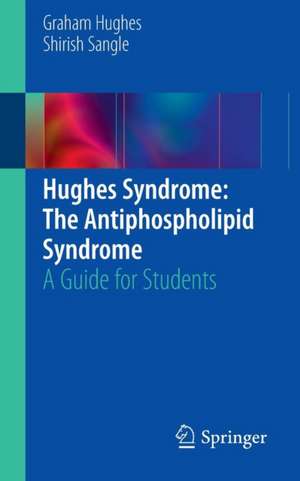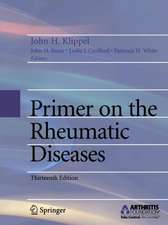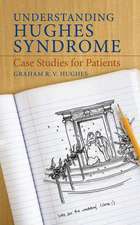Hughes Syndrome: The Antiphospholipid Syndrome: A Guide for Students
Autor Graham Hughes, Shirish Sangleen Limba Engleză Paperback – 20 noi 2011
In 1983, Dr Graham Hughes, and his team in London, described a syndrome and subsequently developed simple blood tests to diagnose the condition. This syndrome is characterised by thrombosis (both in limbs and internal organs), headaches, memory loss, strokes and, in pregnant women, placental clotting and recurrent miscarriage. The syndrome, now known worldwide as Hughes Syndrome, or the Antiphospholipid Syndrome, is common - being responsible for example, for up to 1 in 5 cases of young stroke and more importantly, it is treatable.
Hughes Syndrome: The Antiphospholipid Syndrome, A Guide for Students details the effects of Hughes Syndrome on the major organs, making it a valuable reference tool for students in training.
Preț: 354.65 lei
Preț vechi: 373.32 lei
-5% Nou
Puncte Express: 532
Preț estimativ în valută:
67.86€ • 71.03$ • 56.48£
67.86€ • 71.03$ • 56.48£
Carte tipărită la comandă
Livrare economică 31 martie-14 aprilie
Preluare comenzi: 021 569.72.76
Specificații
ISBN-13: 9780857297389
ISBN-10: 0857297384
Pagini: 102
Ilustrații: XVII, 102 p. 51 illus., 37 illus. in color.
Dimensiuni: 135 x 209 x 7 mm
Greutate: 0.07 kg
Ediția:2012
Editura: SPRINGER LONDON
Colecția Springer
Locul publicării:London, United Kingdom
ISBN-10: 0857297384
Pagini: 102
Ilustrații: XVII, 102 p. 51 illus., 37 illus. in color.
Dimensiuni: 135 x 209 x 7 mm
Greutate: 0.07 kg
Ediția:2012
Editura: SPRINGER LONDON
Colecția Springer
Locul publicării:London, United Kingdom
Public țintă
Professional/practitionerCuprins
History.- Clinical features.- Pregnancy & infertility.- Venous thrombosis.- Migraine & stroke.- Movement disorders & seizures.- Neuro psychiatric aspects.- Spinal cord, multiple sclerosis, peripheral nerves.- The HeartThe arteries.- Kidneys.- Skin.- The eye.- Ear, nose & throat.- Lungs.- Liver & gut.- Bones & joints.- Blood.- Catastrophic APS.- Diagnosis.- Treatment.- Aetiology – genetics vs. environment.- Links to other diseases.- The world map.
Notă biografică
History.- Clinical features.- Pregnancy & infertility.- Venous thrombosis. - Migraine & stroke.- Movement disorders & seizures.- Neuro psychiatric aspects.- Spinal cord, multiple sclerosis, peripheral nerves.- The Heart.- The arteries.- Kidneys.- Skin.- The eye.- Ear, nose & throat.- Lungs.- Liver & gut.- Bones & joints.- Blood.- Catastrophic APS.- Diagnosis.- Treatment.- Aetiology – genetics vs. environment.- Links to other diseases.- The world map.
Textul de pe ultima copertă
Hughes Syndrome: The Antiphospholipid Syndrome, A Guide for Students provides an in-depth analysis into the main effects of Hughes Syndrome.
In 1983, Dr Graham Hughes, and his team in London, described a syndrome and subsequently developed simple blood tests to diagnose the condition. This syndrome is characterised by thrombosis (both in limbs and internal organs), headaches, memory loss, strokes and, in pregnant women, placental clotting and recurrent miscarriage. The syndrome, now known worldwide as Hughes Syndrome, or the Antiphospholipid Syndrome, is common - being responsible for example, for up to 1 in 5 cases of young stroke and more importantly, it is treatable.
Hughes Syndrome: The Antiphospholipid Syndrome, A Guide for Students details the effects of Hughes Syndrome on the major organs, making it a valuable reference tool for students in training.
In 1983, Dr Graham Hughes, and his team in London, described a syndrome and subsequently developed simple blood tests to diagnose the condition. This syndrome is characterised by thrombosis (both in limbs and internal organs), headaches, memory loss, strokes and, in pregnant women, placental clotting and recurrent miscarriage. The syndrome, now known worldwide as Hughes Syndrome, or the Antiphospholipid Syndrome, is common - being responsible for example, for up to 1 in 5 cases of young stroke and more importantly, it is treatable.
Hughes Syndrome: The Antiphospholipid Syndrome, A Guide for Students details the effects of Hughes Syndrome on the major organs, making it a valuable reference tool for students in training.
Caracteristici
Aimed at students in medical education Provides an in-depth look into the effects of Hughes Syndrome A detailed history of Hughes Syndrome Dr Graham Hughes uses personal experience and studies within his analysis Includes supplementary material: sn.pub/extras









